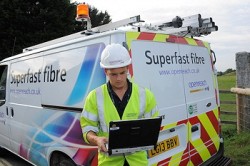UPD BT Committed to Tackling UK Network Congestion Woes Raised by AAISP

BT Wholesale’s incident helpdesk manager has told the boss of broadband provider AAISP, Adrian Kennard, that they’re “fully committed to ensuring that all capacity issues are addressed” after concerns over alleged network congestion on several of BT’s 21st Century Network (21CN) telephone exchanges were raised.
The situation sprang to life after BT’s Chief Network Architect, Neil McRae, initially described AAISP’s claim to have witnessed several weeks’ worth of potentially congestion related problems (e.g. packet loss) on the operators 21CN telephone exchanges in Coventry, Hainault, Southwark, Canonbury and Loughton as “rubbish“, before later adding “there are no BT exchanges at all that have any congestion“.
Advertisement
Naturally it didn’t take long for Kennard to post some illustrations of the problem and blog about the issue (here), which later erupted into a lengthy Twitter row with McRae. Kennard also indicated that his ISP was willing to swap affected customers on to TalkTalk’s uncongested wholesale platform in order to avoid the problem.
Adrian Kennard, Director of ISP Andrews & Arnold, told ISPreview.co.uk:
“Congestion can happen – what matters is how deal with it and BT are clearly letting us down in that area. Even paying BT extra for elevated weighting does not help. This level of loss slows data transfer significantly. On an idle line this loss shows that BT are not reliably delivering the 80 BITs per second of our monitoring packets, far below that needed for VoIP or many other protocols to work without issues.”
The problem, which follows shortly after BTWholesale’s earlier remark that “3% packet loss is not considered as a fault” on the operators hybrid fibre superfast broadband (FTTC) lines (here), has also been spotted by other ISPs that make use of the 21CN platform. But the good news is that, following their very public spat, the situation now seems to have been recognised.
According to BT, the “issue that is currently causing packet loss and slow speeds to end users is with the backhaul links being over utilised” (i.e. ports or lag groups trying to send more than 100% of their capacity). However it’s not known whether this issue affects all of the above named telephone exchange areas or only some of them and we are awaiting clarity on that (expect an update later).
But in most cases BT said that they are now working towards resolving the problem by installing new hardware (fibres and line cards) and are also investigating whether or not it’s possible to provide a temporary fix for related lines until a permanent solution can be implemented.
Advertisement
UPDATE 3rd March 2014
Here’s the official BT response (this actually arrived at the end of last week but it missed our end of play on Friday), albeit in the form of a more general statement than a reply to the specific issue above.
A BTWholesale Spokesperson told ISPreview.co.uk:
“BT Wholesale continues to invest in and monitor its network closely. According to Ofcom, we currently deliver the best network performance in terms of throughput and minimising packet loss and jitter. We aim to maintain that position and if there is any evidence of a dip in network performance we will seek to address it as soon as possible.
We have invested in upgrading our WBC/WBMC network and have recently taken steps to further reduce the impact of short-term spikes in network traffic. We have also launched new services which deliver increased throughput SLAs for our fibre broadband products.
In order to identify ways of improving capacity management and performance, we use a wide range of monitoring mechanisms, including data from our own network and feedback from our customers. If there are some areas where network performance appears to be adversely affected, we would urge our communications provider customers to tell us and to share any end customer data which may help us to identify and address any issues as quickly as possible.”
Mark is a professional technology writer, IT consultant and computer engineer from Dorset (England), he also founded ISPreview in 1999 and enjoys analysing the latest telecoms and broadband developments. Find me on X (Twitter), Mastodon, Facebook, BlueSky, Threads.net and Linkedin.
« RightMove Make Showing Typical Broadband Speeds for UK Homes Permanent






















































Comments are closed